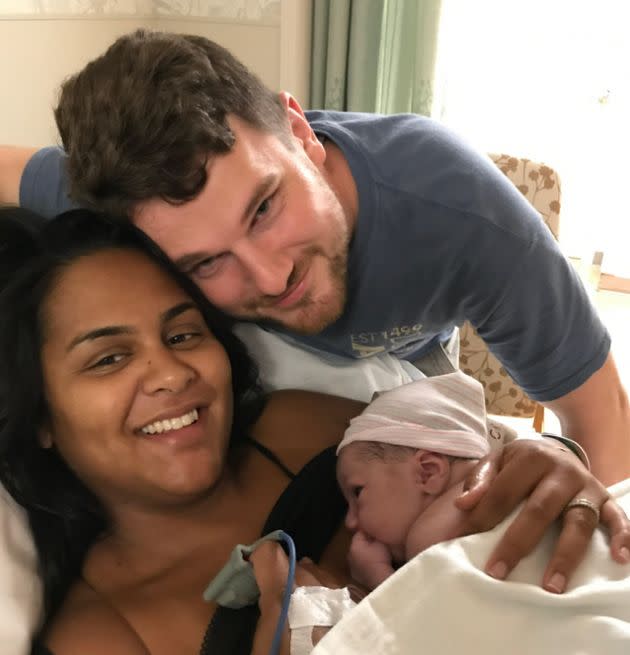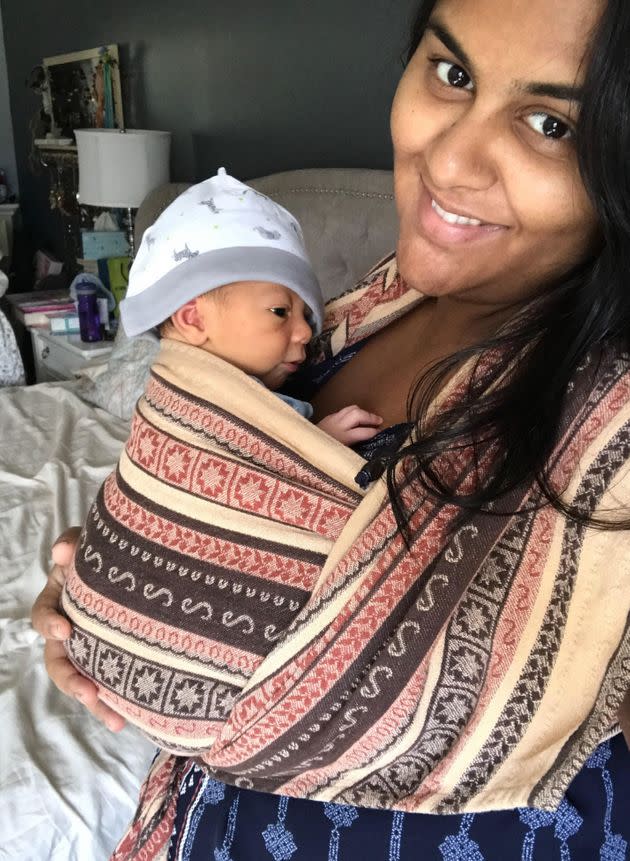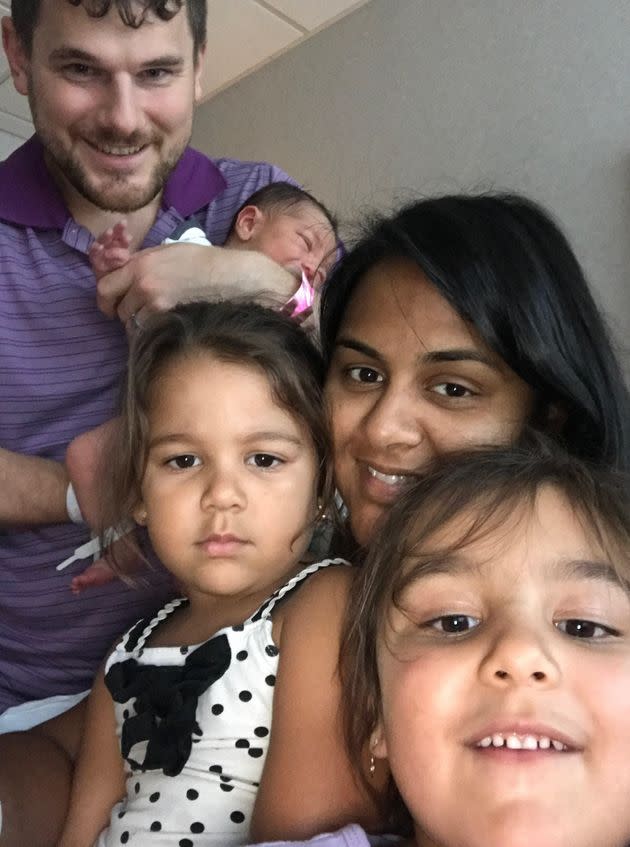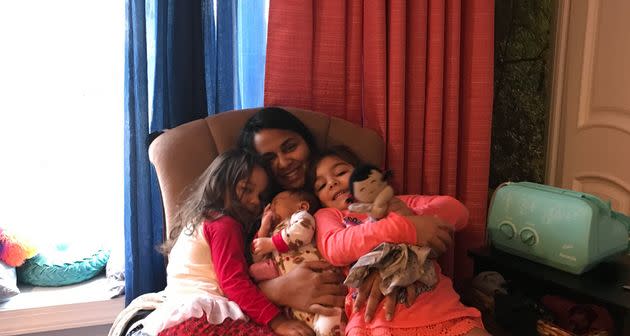My Son's Birth Went Perfectly — But Then I Almost Died. Here's What I Wish I'd Known.

The author with her spouse and son right after his birth. (Photo: Courtesy of Krystal A. Sital)
It’s been 10 hours since I’ve given birth to our third child and even though everything has gone perfectly, I sense something is wrong. Our son is sleeping on my chest, his fingers clutching the neckline of my hospital gown. I disentangle myself from our baby and pass him to my spouse.
“I don’t feel well,” I tell him, already summoning the nurse. “I’m bleeding too much and I feel lightheaded.”
He asks me questions I’m too dizzy to answer. I’ve had pregnancy and delivery complications in the past.
The blood flowing into my pad is constant and much too heavy even for after a vaginal delivery. I call my nurse into the room a few times. The last time she roughly checks the blood flow.
“This is normal,” she insists, explaining everything to me as though this is my first time.
“Something’s wrong,” I insist, sitting up. But she’s already gone, disregarding my concerns for the third time.
I get off the bed and gingerly make my way to the bathroom, every step a jolt producing more and more blood — so much blood it starts streaming down my legs. I see a trail of crimson splashing on white tiles, feel it rolling down between my thighs, hot and fast. I walk through my own blood unable to avoid it, becoming more and more weary with each step.
By the time I reach the toilet, I barely have enough energy to pull down my underpants and sit. I hear the flow of liquid constantly pour into the toilet, though I’m not yet urinating. I look down. When I see how rapidly blood is gushing from my body, I try to call out to my partner, but my voice is so weak it scares me. I blink hard, unable to focus. The room blurs. Just as my hand slips from the silver bar next to me, I instinctively grab the emergency rope.
Then everything goes black.
When I regain consciousness, I’m back on the bed, nurses swarming around me. I see my partner’s head swimming just behind the wall they’ve created between us. My gown is up around my belly, my legs are splayed open, and I feel blood still pouring from my body. Nurses are sopping it up with towels and weighing them on a scale next to me. More nurses mop up the floor with towels and add them to the growing pile of bloodied towels.

The author with her son. "Wrapping baby boy up for the first time," she writes. (Photo: Courtesy of Krystal A. Sital)
One of my doctors flies into the room. She washes her hands and sits between my legs. She pumps my belly with one hand and pushes the other into my vagina. I feel all the stitches that were just put in 10 hours ago rip. Using two gloved fingers as a hook, she pulls clot after clot from my body, each one larger and more difficult to remove than the one before it.
I scream, writhing on the bed. The nurses shut the door and hold me down while she works.
“Krystal, I need to get these out,” she explains, holding up the viscous clots for me to see. She then asks for my permission to continue. I nod but the pain crackles through every nerve in my body. It is hot and hard, and I can’t control my reactions as she pumps on my belly with one hand again and inserts the other into my vagina. I come close to blacking out and I’m only able to see when she pulls back. Blood continues to pour from me.
“I need to take you into surgery immediately.”
I am splayed out on the bed, bloodied and exhausted. I want to cry and sleep and feed my newborn baby. I don’t fully understand it’s a life-or-death decision and she needs an answer now.
“I can’t do anything more like this,” she says.
There is so much urgency in her words and behind her eyes. I look to my partner who is clutching our newborn child and I think about our two daughters, ages 3 and 5, at home with my parents. How could something go so drastically wrong after a healthy pregnancy and perfect delivery?
I nod to my doctor and she springs into action. The way everyone is frantically moving, it’s like a scene from a movie, except I’m living it and once I leave this room, I may never return. The nurses close my legs for me then cover and wrap me up. They start wheeling me out of the hospital room and now I’m the one who’s frantic, looking to my spouse who is still clutching our son, the terror in his eyes like I’ve never seen before matching what I feel inside. Would that be the last thing I ever saw? Is this how I will die? Will I never get to nuzzle my girls again, read them a book, fall asleep with their hair all around my face? Will I never get to see our son yawn and giggle and stretch and learn to walk and talk? Will I never get to know them?
“Call my mom. Come with me. Please!” I’m crying as we start moving. I don’t want to leave our son alone but when he hands the baby to the nearest nurse and sprints to me, I cry even more. He holds me tightly as they wheel my bed to the operating room. I’m so cold I start shivering and nothing they do can make me warm.
“Krystal, I don’t know what we’re going to find when we get in there.”
Those are the last words my doctor says to me.
“Honey, I love you. You are my everything.” Those are the last words my partner and I say to each other.

The author, her spouse, their two daughters, and newborn son posing at the hospital for their first family selfie after she gave birth. (Photo: Courtesy of Krystal A. Sital)
And then I’m in the operating room with both his words and the doctor’s echoing in my head. Am I leaving behind children who will be motherless and a partner who will be alone? And what about my parents? They’ll only have one daughter instead of two. And my only sister? She’ll have no sibling at all.
We whispered our I love yous but it isn’t nearly enough. This man has been everything to me. This kind of love that’s perfect and pure. I see his green eyes glittering behind tears as he watches me go ― this man I met when he was just 14 years old. The last thing I see are the fluorescent operating room lights being adjusted by bloody blue gloves. My blood glows down on me below the two large circles of light.
***
“It’s postpartum atony,” my doctor says the next day. Also called uterine atony, it happens when the uterus does not contract normally to help push the placenta out after birth. It’s the most common cause of postpartum hemorrhage (PPH) — heavy bleeding after birth — and usually happens within one day of giving birth, but can happen up to 12 weeks after having a baby. As noted on Stanford Children’s Health website, PPH can also be caused by a tear in the cervix or tissues of the vagina, a tear in the blood vessel in the uterus, a hematoma, a blood clotting disorder, or placenta problems. If you are Asian or Hispanic, you have a significantly higher risk of suffering from PPH. Being mixed race, I belong to both groups, which puts me at a high risk — none of which I knew until I decided to do my own research. I couldn’t help but wonder if my doctors and nurses had considered this and been on the lookout for PPH.
The most important thing to know about PPH is that it’s preventable. It does, however, need prompt diagnosis and treatment. I had been demanding attention, but no one was listening.
PPH affects 14 million women around the world every year. The risk of dying from PPH is one in a thousand in developing countries. In the United States, a woman dies every 10 minutes — roughly the time it takes to read this essay — from pregnancy-related complications and PPH is the leading cause of death. This means 125,000 women a year are affected. I came too damn close to being a statistic. It was one of the most terrifying and traumatizing moments of my life.
While the worldwide maternal mortality ratio has dropped by about 38% between 2000 and 2017, according to the World Health Organization, it has more than doubled in the U.S. from 10.3 per 100,000 live births in 1991 to 23.8 in 2014. And according to the Centers for Disease Control and Prevention’s national surveillance of pregnancy-related deaths, there has been an overall increase in pregnancy-related deaths from 7.2 per 100,000 live births in 1987 to an alarming 18 in 2014. So why is something so preventable the leading cause of maternal death?
From what nurses could collect and measure, they calculated I’d lost a half-gallon of blood. In 15 minutes. That is 30% to 40% of a person’s blood volume. If you lose more than 40%, your organs will stop working and it’s likely, because your body can’t compensate for much longer, you’ll slip into a coma. I’d been entering dangerous territory when they revived me on the bed.

The author and her three children at home. "My beautiful kids love to hop on me mid-pump," she writes. (Photo: Courtesy of Krystal A. Sital)
After uterine massages didn’t work to help with my contractions, my doctor needed to take me into emergency surgery. When she said the words that have haunted me and changed my perception on life — “I don’t know what we’re going to find when we get in there” — it could have meant anything from a hysterectomy to death.
I emerged alive but damaged, scarred and completely lost. After everything I went through, I declined a blood transfusion, terrified something else could happen if I took on the blood of another human being. By refusing the blood transfusion, my recovery dragged on for more than a year. To walk a handful of steps without enough blood coursing through my veins rendered me as helpless as the infant I was supposed to be taking care of. Getting to the bathroom left me a shivering, sweaty mess, unable to make the journey back to bed.
On top of the physical challenge of healing, I was psychologically traumatized and suffered from post-traumatic stress disorder. I couldn’t sleep. As soon as I did, I’d wake up screaming and thrashing, the bloodied operating room lights burned on the inside of my eyelids. This went on for years.
Thanks to my family, I had help putting myself back together. But I often think about the women who don’t have any community or support. What happens to them and their children? If I hadn’t lost almost 40% of my blood as rapidly as I did, no one would have caught it. I could have been discharged. The next time I would have been scheduled to see a doctor after vaginal delivery would have been six weeks later. What if that scene transpired when I was home alone with my baby and unable to get to a phone?
Focusing only on the baby after childbirth is dangerous. Women are sent home too early and not given the proper support and medical care they need. Even after the trauma I experienced, I was discharged within the regular 48-hour period with no follow-up on my mental health care. Because of this, for a long time, I, like many women, existed in an unknown state, one that was relentlessly dismal and bleak.
Too often, because women aren’t taken seriously ― especially women of color ― we need to be our own advocates. (It shouldn’t be this way but it is.)
Some questions you can ask your doctor:
What are the risk factors for postpartum hemorrhage?
Am I at risk for PPH?
What can you (and I) do to be on the lookout for PPH after my baby is born?
Having emerged somewhat intact, I am shaken and sobered by the devastating facts and numbers I’ve learned about the preventable state of our maternal mortality rate, not only in developed countries but worldwide. I am so lucky to have been able to survive that day and to have eventually replaced the glowing operating room lights with the soft honey brown of my son’s eyes.
Too many women don’t get that chance.
Krystal A. Sital is the author of the critically acclaimed memoir “Secrets We Kept: Three Women of Trinidad.” Her work has been featured in Elle, The New York Times, Salon, Today’s Parent, Parents Magazine, Catapult, LitHub, and elsewhere. Follow her on Instagram at @krystalsital.
Do you have a compelling personal story you’d like to see published on HuffPost? Find out what we’re looking for here and send us a pitch.
This article originally appeared on HuffPost and has been updated.

